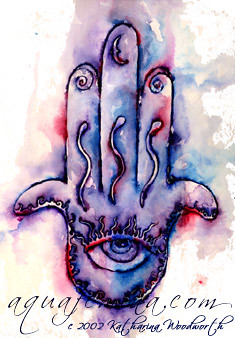Just the other day I was talking with someone about how it seems that nowadays a lot of graphic novels (i.e. fancy comic books) have been grappling with religious themes. (for example, look at The Sandman, Lucifer, or Hellblazer which formed the basis for the film Constantine). This is also evident in the work of acclaimed graphic novelist Alan Moore, a practicing Gnostic... and also author of the anarchist fable, V for Vendetta.)
The other day I was in my local comic book store and found a book about Moore which contained a pretty thought-provoking interview where he shares his thoughts on religion:
What I'm saying is that, to me, organised religion seems to be an accumulation of dead ritual, lifeless dogma; and largely fear-driven belief that has built up around some original kernel of genuine spiritual experience. From what I understand of the original Essenes, for example, they were Gnostics. That is to say, their spirituality was based not upon faith or belief but upon personal apprehension and knowledge, or gnosis, of the powers at work in the Universe. They didn't believe:
They knew. If there over was such a historical personage as Jesus Christ, and if this person did have a group of Apostles around him, they were not acting from belief either. Saul/Paul had the heavenly searchlight turned upon him during his day trip to Damascus. Pentecostal Fire danced on their tongues. Thomas... a pure-bred I'm-From-Missouri Gnostic if ever I heard of one... even put his hand in the wound of the resurrected messiah. Gnosis ... personal knowledge and experience of the spiritual I have no problem with.
What I do have a problem with is the middle management who have manouvered themselves between the wellspring and those who thirst in the field of spirituality just as efficiently as they've done it in every other field of human endeavour. It seems to me that when the blueprint for the modern Christian faith was first sketched out by the Emperor Constantine and his marketing department, it was constructed largely to solve a couple of immediate Earthly problems that Rome was faced with at the time. They had a city divided by different theological factions, the largest and noisiest probably being the early Christian zealots. Then there was the cult of *Mithras*, which was smaller but which included the bulk of the Roman Military. Finally there was the cult of Sol *Invictus*, the undefeated Sun, which was relatively small but very popular amongst the merchant class.
Constantine's posse came up with a composite religion to unite Rome: Christianity would incorporate large chunks of Mithraism, including the stuff about being born in a cave surrounded by shepherds and animals on the 25th of December, and would make concessions to the cult of Sol Invictus, the Undefeated Sun, by sticking a big Sun-symbol behind the messiah's head in all the publicity handouts. This is politics.
The effect in spiritual terms is to move the emphasis away from any genuine personal spiritual experience. Whereas for the original Gnostics such a personal knowledge of and direct communication with the Godhead was the cornerstone of their spiritual life, after the priesthood moved in the basic proposition was vastly different:
"You don't need to have had a transforming experience yourselves, and in fact neither do the priesthood need to have had a transforming experience. The important thing is that we have this book, about people� who lived a long time ago, and they had transforming experiences, and if you come along on Sunday we'll read to you about them, and that will be. your transforming experience." This sounds to me like a co-opting of the divine impulse a channeling of the individual's spiritual aspirations into a mechanism for social regulation.
So, no, I'm not a big fan of organised religion of any kind.
It's a lot to think about. On the one hand, I have an "inner Taliban" which is very much enamored by orthodoxy and tradition. On the other hand, another part of me is very sympathetic to Moore's point and is a spiritual "anarchist" of sorts. I feel that both tendancies are necessary and each serves as a corrective to the excesses of the other.
some previous entries which have touched on some related themes are:
the guru principle
carlos santana
protestant islam
muslim anarchism
not spiritual but religious
"'x-men' is not a cleverly named documentary about the nation of islam..."
anarchism, hollywood style
I think I'll stop here and elaborate a little more later...
The other day I was in my local comic book store and found a book about Moore which contained a pretty thought-provoking interview where he shares his thoughts on religion:
What I'm saying is that, to me, organised religion seems to be an accumulation of dead ritual, lifeless dogma; and largely fear-driven belief that has built up around some original kernel of genuine spiritual experience. From what I understand of the original Essenes, for example, they were Gnostics. That is to say, their spirituality was based not upon faith or belief but upon personal apprehension and knowledge, or gnosis, of the powers at work in the Universe. They didn't believe:
They knew. If there over was such a historical personage as Jesus Christ, and if this person did have a group of Apostles around him, they were not acting from belief either. Saul/Paul had the heavenly searchlight turned upon him during his day trip to Damascus. Pentecostal Fire danced on their tongues. Thomas... a pure-bred I'm-From-Missouri Gnostic if ever I heard of one... even put his hand in the wound of the resurrected messiah. Gnosis ... personal knowledge and experience of the spiritual I have no problem with.
What I do have a problem with is the middle management who have manouvered themselves between the wellspring and those who thirst in the field of spirituality just as efficiently as they've done it in every other field of human endeavour. It seems to me that when the blueprint for the modern Christian faith was first sketched out by the Emperor Constantine and his marketing department, it was constructed largely to solve a couple of immediate Earthly problems that Rome was faced with at the time. They had a city divided by different theological factions, the largest and noisiest probably being the early Christian zealots. Then there was the cult of *Mithras*, which was smaller but which included the bulk of the Roman Military. Finally there was the cult of Sol *Invictus*, the undefeated Sun, which was relatively small but very popular amongst the merchant class.
Constantine's posse came up with a composite religion to unite Rome: Christianity would incorporate large chunks of Mithraism, including the stuff about being born in a cave surrounded by shepherds and animals on the 25th of December, and would make concessions to the cult of Sol Invictus, the Undefeated Sun, by sticking a big Sun-symbol behind the messiah's head in all the publicity handouts. This is politics.
The effect in spiritual terms is to move the emphasis away from any genuine personal spiritual experience. Whereas for the original Gnostics such a personal knowledge of and direct communication with the Godhead was the cornerstone of their spiritual life, after the priesthood moved in the basic proposition was vastly different:
"You don't need to have had a transforming experience yourselves, and in fact neither do the priesthood need to have had a transforming experience. The important thing is that we have this book, about people� who lived a long time ago, and they had transforming experiences, and if you come along on Sunday we'll read to you about them, and that will be. your transforming experience." This sounds to me like a co-opting of the divine impulse a channeling of the individual's spiritual aspirations into a mechanism for social regulation.
So, no, I'm not a big fan of organised religion of any kind.
It's a lot to think about. On the one hand, I have an "inner Taliban" which is very much enamored by orthodoxy and tradition. On the other hand, another part of me is very sympathetic to Moore's point and is a spiritual "anarchist" of sorts. I feel that both tendancies are necessary and each serves as a corrective to the excesses of the other.
some previous entries which have touched on some related themes are:
the guru principle
carlos santana
protestant islam
muslim anarchism
not spiritual but religious
"'x-men' is not a cleverly named documentary about the nation of islam..."
anarchism, hollywood style
I think I'll stop here and elaborate a little more later...





